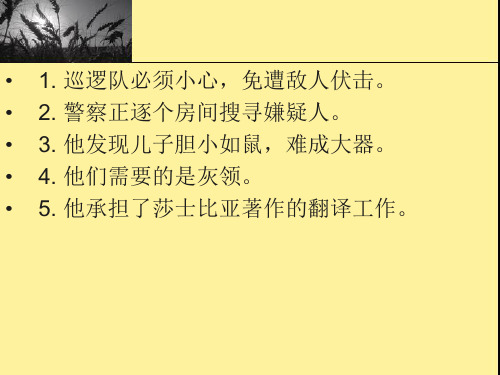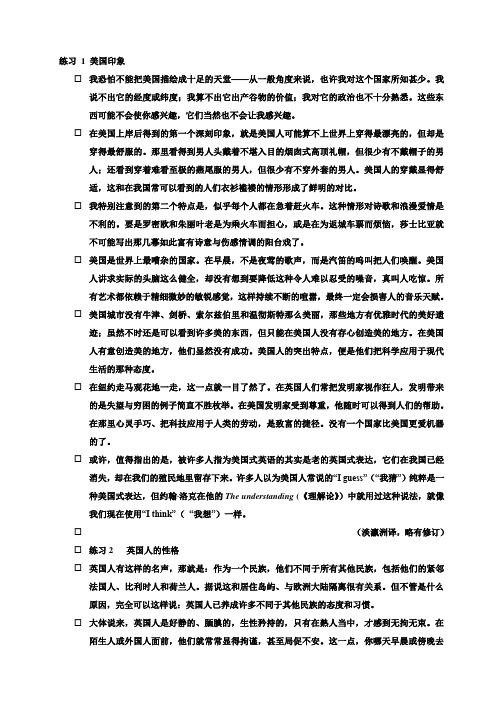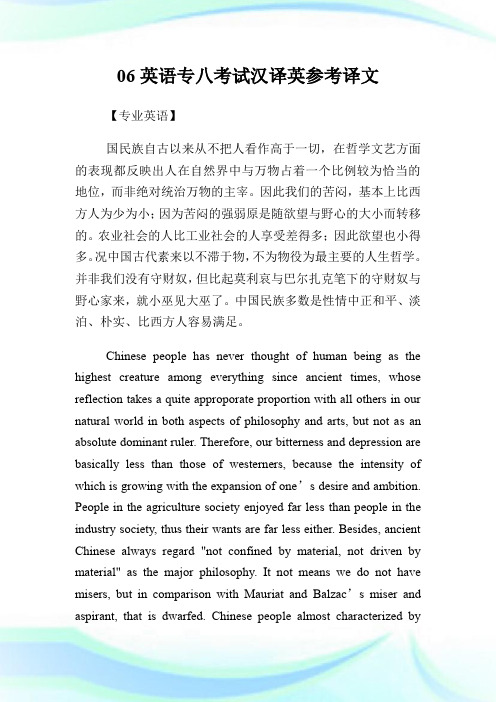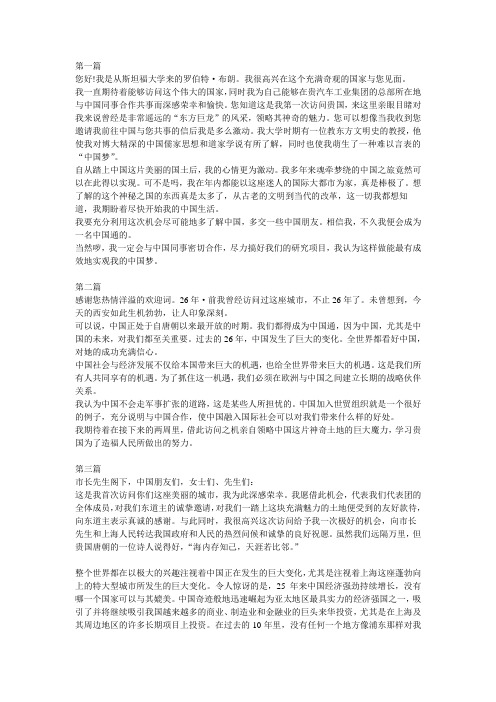汉翻英译文
汉译英 经典翻译

现在进行课堂讨论,特别 注意对原句的理解和译句 语感的再现
1.上课了? 2.他(听到这话)心里一跳,脸色也变了。 3.三四个酒保,都手忙脚乱,搬东搬西。 4.你不知道,他这个家伙背景复杂,不大讲 面子。
参考译文
上课了? (Have you) Just finished your class? How’s your first class? Has the bell gone? / Am I late for class? 他(听到这话)心里一跳,脸色也变了。 At this his heart missed a beat and he became pale. 三四个酒保,都手忙脚乱,搬东搬西。 The four or five waiters were busy rushing from one to another serving food and drink. (Outlaws of the Marsh) 你不知道,他这个家伙背景复杂,不大讲面子。 Don’t you realize that this fellow has all kinds of dubious connections and that he’s no great respecter of persons?
语言转换与思维
一、语言转换 序
之结构顺
• • • • • • •
(某)主体-行为标志-行为-行为客体 (某)主体-行为-行为客体-行为标志 S+ad. +V+O(C) S+V+O+ad. (E) 试译下列两句: 我30多年来一直没有见过他。
弗瑞德把它拿回家,几天之后,又把它包扎得 漂漂亮亮地送回来了。
•
• •
• • • • • • • • • • • • • • • • •
英译汉-翻译参考译文

练习1 美国印象☐我恐怕不能把美国描绘成十足的天堂——从一般角度来说,也许我对这个国家所知甚少。
我说不出它的经度或纬度;我算不出它出产谷物的价值;我对它的政治也不十分熟悉。
这些东西可能不会使你感兴趣,它们当然也不会让我感兴趣。
☐在美国上岸后得到的第一个深刻印象,就是美国人可能算不上世界上穿得最漂亮的,但却是穿得最舒服的。
那里看得到男人头戴着不堪入目的烟囱式高顶礼帽,但很少有不戴帽子的男人;还看到穿着难看至极的燕尾服的男人,但很少有不穿外套的男人。
美国人的穿戴显得舒适,这和在我国常可以看到的人们衣衫褴褛的情形形成了鲜明的对比。
☐我特别注意到的第二个特点是,似乎每个人都在急着赶火车。
这种情形对诗歌和浪漫爱情是不利的。
要是罗密欧和朱丽叶老是为乘火车而担心,或是在为返城车票而烦恼,莎士比亚就不可能写出那几幕如此富有诗意与伤感情调的阳台戏了。
☐美国是世界上最嘈杂的国家。
在早晨,不是夜莺的歌声,而是汽笛的呜叫把人们唤醒。
美国人讲求实际的头脑这么健全,却没有想到要降低这种令人难以忍受的噪音,真叫人吃惊。
所有艺术都依赖于精细微妙的敏锐感觉,这样持续不断的喧嚣,最终一定会损害人的音乐天赋。
☐美国城市没有牛津、剑桥、索尔兹伯里和温彻斯特那么美丽,那些地方有优雅时代的美好遗迹;虽然不时还是可以看到许多美的东西,但只能在美国人没有存心创造美的地方。
在美国人有意创造美的地方,他们显然没有成功。
美国人的突出特点,便是他们把科学应用于现代生活的那种态度。
☐在纽约走马观花地一走,这一点就一目了然了。
在英国人们常把发明家视作狂人,发明带来的是失望与穷困的例子简直不胜枚举。
在美国发明家受到尊重,他随时可以得到人们的帮助。
在那里心灵手巧、把科技应用于人类的劳动,是致富的捷径。
没有一个国家比美国更爱机器的了。
☐或许,值得指出的是,被许多人指为美国式英语的其实是老的英国式表达,它们在我国已经消失,却在我们的殖民地里留存下来。
许多人以为美国人常说的“I guess”(“我猜”)纯粹是一种美国式表达,但约翰∙洛克在他的The understanding (《理解论》)中就用过这种说法,就像我们现在使用“I think”(“我想”)一样。
06英语专八考试汉译英参考译文.doc

06英语专八考试汉译英参考译文【专业英语】国民族自古以来从不把人看作高于一切,在哲学文艺方面的表现都反映出人在自然界中与万物占着一个比例较为恰当的地位,而非绝对统治万物的主宰。
因此我们的苦闷,基本上比西方人为少为小;因为苦闷的强弱原是随欲望与野心的大小而转移的。
农业社会的人比工业社会的人享受差得多;因此欲望也小得多。
况中国古代素来以不滞于物,不为物役为最主要的人生哲学。
并非我们没有守财奴,但比起莫利哀与巴尔扎克笔下的守财奴与野心家来,就小巫见大巫了。
中国民族多数是性情中正和平、淡泊、朴实、比西方人容易满足。
Chinese people has never thought of human being as the highest creature among everything since ancient times, whose reflection takes a quite approporate proportion with all others in our natural world in both aspects of philosophy and arts, but not as an absolute dominant ruler. Therefore, our bitterness and depression are basically less than those of westerners, because the intensity of which is growing with the expansion of one’s desire and ambition. People in the agriculture society enjoyed far less than people in the industry society, thus their wants are far less either. Besides, ancient Chinese always regard "not confined by material, not driven by material" as the major philosophy. It not means we do not have misers, but in comparison with Mauriat and Balzac’s miser and aspirant, that is dwarfed. Chinese people almost characterized bymoderation, peacefulness, insecular, plainess, and easier to get satisfied than westerners.。
英译汉参考译文

第一篇您好!我是从斯坦福大学来的罗伯特·布朗。
我很高兴在这个充满奇观的国家与您见面。
我一直期待着能够访问这个伟大的国家,同时我为自己能够在贵汽车工业集团的总部所在地与中国同事合作共事而深感荣幸和愉快。
您知道这是我第一次访问贵国,来这里亲眼目睹对我来说曾经是非常遥远的“东方巨龙”的风采,领略其神奇的魅力。
您可以想像当我收到您邀请我前往中国与您共事的信后我是多么激动。
我大学时期有一位教东方文明史的教授,他使我对博大精深的中国儒家思想和道家学说有所了解,同时也使我萌生了一种难以言表的“中国梦”。
自从踏上中国这片美丽的国土后,我的心情更为激动。
我多年来魂牵梦绕的中国之旅竟然可以在此得以实现。
可不是吗,我在年内都能以这座迷人的国际大都市为家,真是棒极了。
想了解的这个神秘之国的东西真是太多了,从古老的文明到当代的改革,这一切我都想知道,我期盼着尽快开始我的中国生活。
我要充分利用这次机会尽可能地多了解中国,多交一些中国朋友。
相信我,不久我便会成为一名中国通的。
当然哕,我一定会与中国同事密切合作,尽力搞好我们的研究项目,我认为这样做能最有成效地实观我的中国梦。
第二篇感谢您热情洋溢的欢迎词。
26年·前我曾经访问过这座城市,不止26年了。
未曾想到,今天的西安如此生机勃勃,让人印象深刻。
可以说,中国正处于自唐朝以来最开放的时期。
我们都得成为中国通,因为中国,尤其是中国的未来,对我们都至关重要。
过去的26年,中国发生了巨大的变化。
全世界都看好中国,对她的成功充满信心。
中国社会与经济发展不仅给本国带来巨大的机遇,也给全世界带来巨大的机遇。
这是我们所有人共同享有的机遇。
为了抓住这一机遇,我们必须在欧洲与中国之间建立长期的战略伙伴关系。
我认为中国不会走军事扩张的道路,这是某些人所担忧的。
中国加入世贸组织就是一个很好的例子,充分说明与中国合作,使中国融入国际社会可以对我们带来什么样的好处。
我期待着在接下来的两周里,借此访问之机亲自领略中国这片神奇土地的巨大魔力,学习贵国为了造福人民所做出的努力。
汉翻英

• 你能为这次聚会做些什么? • What ca you do for the party? • 他想喝些水。 • He would like somo you often play football here? • 你经常在周末听音乐吗? • Do you often listen to music on the weekend? • Lily经常在周末弹琵琶。 • Lily often plays the pipa on the weekend. • 吴一凡经常在周末看电视 • WuYifan often watches TV on the weeekend. • 你想吃什么? • What would you like to eat?
汉翻英
• • • • • • • • • •
1 你认识杨老师吗? Do you know Mr Young? 他是我们的音乐老师. He is our music teacher. 他年轻吗? Is he young? 我喜欢有趣的老师。 I like funny teachers. 谁是你的美术老师? Who is your art teacher?
• 王老师将是我们新的语文老师。 • Miss Wang will be our new Chinese teacher. • 你认识她吗? • Do you know her? • 你的爸爸是什么样子的? • What's your father like? • 她会说英语和语文。 • She can speak English and Chinese. • 他在家非常有用。 • He is very helpful at home.
• 看我的图片。 • Look at my picture. • 你在星期二有什么课? • What do you have on Tuesday? • 我在星期四有一节烹饪课 • I have a cooking class on Thursday. • 今天是星期几? • What day is it today? • 你经常在公园里看书吗? • Do you often read books in the park?
专八经典翻译---汉译英篇

1)在得病以前,我受父母宠爱,在家中横行霸道。
译文:Before I fell ill,I had been the bully under roofs owing to my doting parents.(PS:“横行霸道”在此并无“任意欺凌他人”之意,而是“想干什么就干什么,为所欲为”,可用get everything my all own way或be the bully表达)(2)这所全国重点大学为社会输送了大批的人才译文:The national key university has prepared batches of qualified graduates for the society(PS:“输送”在句中是一个模糊笼统的词,具体说来是指“培养出”。
“人才”也比较笼统,这里译为qualified graduates 是比较确切的。
)(3)他是个“墙头草”,谁硬就跟谁。
译文:He always sits on the fence and falls on the side of the stronger.(PS: "墙头草”是个比喻,与英语中的sit on the fence 含义一样。
为了译出其内在含义,译文选择了舍弃其表面意义。
)(4)这样,每个地方都有自己的传说,风俗也就衍传了下来。
译文:Thus,every place,with its own legends and tales,has its traditions and customs passed on from generation to generation.(PS: 汉译英时,汉语中有些动词都可以用介词短语来表达,这样更形象。
)(5)面对一池碧水,将忧心烦恼全都抛在一边,使自己的身心得以充分休息。
译文:When facing a pool of green water,you forget all your worries and annoyance and enjoy a good rest,both mentally and physically.(PS: 英语代词比汉语代词种类多,用法更别多,汉译英时,注意增译出其隐含在句中的代词。
汉译英原文及参考译文

三、史学方法
史学方法是任何历史研究工作者必须学习的课程, 也是正确掌握历史研究的一种重要训练。它包括 史学家使用的各种技术和准则,通过他们史学家 用第一手资源和其他研究证据写出历史。在历史 哲学中,合理的历史方法的性质甚至还有可能性 等问题,被当作认识论问题提了出来。其追随者 则以外部批评、内部批评和综合法为标题,对史 学家在研究工作中常用的历史准则进行概括。 (173)
四、中国结
中国结是一种古老的编织艺术。中国人自汉 代就把中国结用作装饰。现在的人们仍然对传 统中国结复杂的美和编织秘密感到不解。“结” 在中文的含义是团聚、友谊、温暖和结婚,等 等。所以中国结也成为团聚、幸运、和谐和爱 的 象征。
制作传统的中国结必须用一根红绳弯曲、 打结、编织,喻义是无穷无尽的幸福生活的循 环。这是中国结最重要的特征。把不同的结和 其它的吉祥饰物巧妙的结合在一起,就是一个 独特的吉祥饰品,特别是代表美、幸福和愿望 的红色。
英译汉-翻译参考译文

练习1 美国印象☐我恐怕不能把美国描绘成十足的天堂——从一般角度来说,也许我对这个国家所知甚少。
我说不出它的经度或纬度;我算不出它出产谷物的价值;我对它的政治也不十分熟悉。
这些东西可能不会使你感兴趣,它们当然也不会让我感兴趣。
☐在美国上岸后得到的第一个深刻印象,就是美国人可能算不上世界上穿得最漂亮的,但却是穿得最舒服的。
那里看得到男人头戴着不堪入目的烟囱式高顶礼帽,但很少有不戴帽子的男人;还看到穿着难看至极的燕尾服的男人,但很少有不穿外套的男人。
美国人的穿戴显得舒适,这和在我国常可以看到的人们衣衫褴褛的情形形成了鲜明的对比。
☐我特别注意到的第二个特点是,似乎每个人都在急着赶火车。
这种情形对诗歌和浪漫爱情是不利的。
要是罗密欧和朱丽叶老是为乘火车而担心,或是在为返城车票而烦恼,莎士比亚就不可能写出那几幕如此富有诗意与伤感情调的阳台戏了。
☐美国是世界上最嘈杂的国家。
在早晨,不是夜莺的歌声,而是汽笛的呜叫把人们唤醒。
美国人讲求实际的头脑这么健全,却没有想到要降低这种令人难以忍受的噪音,真叫人吃惊。
所有艺术都依赖于精细微妙的敏锐感觉,这样持续不断的喧嚣,最终一定会损害人的音乐天赋。
☐美国城市没有牛津、剑桥、索尔兹伯里和温彻斯特那么美丽,那些地方有优雅时代的美好遗迹;虽然不时还是可以看到许多美的东西,但只能在美国人没有存心创造美的地方。
在美国人有意创造美的地方,他们显然没有成功。
美国人的突出特点,便是他们把科学应用于现代生活的那种态度。
☐在纽约走马观花地一走,这一点就一目了然了。
在英国人们常把发明家视作狂人,发明带来的是失望与穷困的例子简直不胜枚举。
在美国发明家受到尊重,他随时可以得到人们的帮助。
在那里心灵手巧、把科技应用于人类的劳动,是致富的捷径。
没有一个国家比美国更爱机器的了。
☐或许,值得指出的是,被许多人指为美国式英语的其实是老的英国式表达,它们在我国已经消失,却在我们的殖民地里留存下来。
许多人以为美国人常说的“I guess”(“我猜”)纯粹是一种美国式表达,但约翰∙洛克在他的The understanding (《理解论》)中就用过这种说法,就像我们现在使用“I think”(“我想”)一样。
- 1、下载文档前请自行甄别文档内容的完整性,平台不提供额外的编辑、内容补充、找答案等附加服务。
- 2、"仅部分预览"的文档,不可在线预览部分如存在完整性等问题,可反馈申请退款(可完整预览的文档不适用该条件!)。
- 3、如文档侵犯您的权益,请联系客服反馈,我们会尽快为您处理(人工客服工作时间:9:00-18:30)。
(1)William Cowper - Country MusicMy greenhouse is never so pleasant as when we are just upon the point of being turned out of it. The gentleness of the autumnal suns, and the calmness of this latter season make it a much more agreeable retreat than we ever find it in summer: when, the winds being generally brisk, we cannot cool it by admitting a sufficient quantity of air without being at the same time incommoded by it. But now I sit with all the windows and the door wide open, and am regaled with the scent of every flower in a garden as full of flowers as I have known how to make it. We keep no bees, but if I lived in a hive I should hardly hear more of their music. All the bees in the neighbourhood resort to a bed of mignonette, opposite to the window, and pay me for the honey they get out of it by a hum, which, though rather monotonous, is as agreeable to my ear as the whistling of my linnets. All the sounds that nature utters are delightful, --at least in this country. I should not perhaps find the roaring of lions in Africa, or of bears in Russia, very pleasing; but I know no beast in England whose voice I do not account musical, save and except always the braying of an ass.The notes of all our birds and fowls please me, without an exception. I should not indeed think of keeping a goose in a cage, that I might hang him up in the parlour for the sake of his melody, but a goose upon a common, or in a farm-yard, is no bad performer; and as to insects, if the black beetle, and beetles indeed of all hues, will keep out of my way, I have no objection to any of the rest; on the contrary, in whatever key they sing, from the gnat’s fine treble to the bass of the humble-bee, I admire them all.(2)Roger Ascham - Seeing the WindTo see the wind, with a man his eyes, it is unpossible, the nature of it is so fine, and subtle, yet this experience of the wind had I once myself, and that was in the great snow that fell four years ago: I rode in the highway betwixt Topcliffe-upon-Swale, and Berowe Bridge, the way being somewhat trodden afore, by wayfaring men. The fields on both sides were plain and lay almost yard deep with snow, the night afore had been a little frost, so that the snow was hard and crusted above. That morningthe sun shone bright and clear, the wind was whistling aloft, and sharp according to the time of the year. The snow in the highway lay loose and trodden with horse feet: so as the wind blew, it took the loose snow with it, and made it so slide upon the snow in the field which was hard and crusted by reason of the frost overnight, that thereby I might see very well, the whole nature of the wind as it blew that day. And I had a great delight and pleasure to mark it, which maketh me now far better to remember it. Sometime the wind would be not past two yards broad, and so it would carry the snow as far as I could see. Another time the snow would blow over half the field at once. Sometime the snow would tumble softly, by and by it would fly wonderful fast. And this I perceived also that the wind goeth by streams and not whole together. For I should see one stream within a score on me, then the space of two score no snow would stir, but after so much quantity of ground, another stream of snow at the same very time should be carried likewise, but not equally. For the one would stand still when the other flew apace, and so continue sometime swiftlier, sometime slowlier, sometime broader, sometimenarrower, as far as I could see. Nor it flew not straight, but sometime it crooked this way sometime that way, and sometime it ran about in a compass. And sometime the snow would be lift clean from the ground into the air, and by and by it would be all clapped to the ground as though there had been no wind at all, straightway it would rise and fly again.And that which was the most marvel of all, at one time two drifts of snow flew, the one out of the West into the East, the other out of the North into the East: And I saw two winds by reason of the snow the one cross over the other, as it had been two highways. And again I should hear the wind blow in the air, when nothing was stirred at the ground. And when all was still where I rode, not very far from me the snow would be lifted wonderfully. This experience made me more marvel at the nature of the wind than it made me cunning in the knowledge of the wind: but yet thereby I learned perfectly that it is no marvel at all though men in a wind lose their length in shooting, seeing so many ways the wind is so variable in blowing.(3)Daoism and Leisure1There has been much discussion of Daoism, but most of this has been about the revised version that developed after the Han dynasty and which had two branches. One was the art of Huang Lao, a form of strategy for government that politicized Daoist thought into a way of ruling based on the concept of letting society recover vitality through rest. Another branch was “religious Daoism.”Religious Daoism is quite different form philosophical Daoism, and has its own origins. There can be traced back to the northern coastal culture of China and the practices of medicine men. The constantly changing ocean environment endowed this school of thought with a sense of mystery and magic, closely related to the ancient witchcraft traditions of exorcism and healing. This developed into the Dao of longevity and alchemy, and finally into religious Daoism.The blurring of philosophical Daoism with religious Daoism occurred after the Han dynasty. Most religious in the world tend to downplay, disdain the present world, and focus on the afterworld. Only religious Daoism advocates prolonging the life of the body and tries to directly transform it. This is quite unique.It also drew upon the ancients for backing. We know that early Han-dynasty religious Daoism was very fragmented, but by the end of the Eastern Han it had become fully developed, and referred back to Laozi and Zhuangzi as its predecessors.If we want to talk about the culture of leisure in Chinese tradition, we must turn to these pre-Qin Daoists and not to the religious Daoism that came later.2The sense of leisure constitutes another realm of the self, expressed in Zhuangzi’ s section on “unburdened Roaming” (Xiao Yao You). It is artistic and emotional, and has its theatrical foundation in philosophical Daoism.Its most important explanation can be found in the “Inner Volumes” of Zhuangzi, which describe how everything in this world, including the human body, goes through a natural cycle of birth and destruction. This is what Zhuangzi calls “transformation” (hua), and contains a sense of creativity. To Zhuangzi, knowledge is actually a game we create in which we select a few things, make up theories about them, and finally come up with a world view. Other people might produce a completely different one.On closer inspection, this theory can become very complicated. Its simplest version, however, can be found in Zhuangzi’s “On Ordering Things” (Qi Wu Lun). Here he says that our knowledge about nature, and truth and falsity of opinion is entirely based on criteria that we choose ourselves. Regardless of what people claim, however, the world changes according to its own internal principles.Take human life for example. From nothing you become something, go through your existence, and then finally pass away. This is the natural “Way” of your life.Trying to change things, as proposed by Confucian thinking, is meaningless and unnecessary.(4)Reflecting on the FutureThe word “future” loaded with such associations as “progress”, “beauty” and “expectation” has an irresistible temptation for everybody. Since it is human nature to long for changes of their circumstances and for a better life, they invariably want to calculate and predict the future.Back in the 1980s, the Americans shot a film titled Brave New World, in which the people are exclusively incubated in test tubes. As their thoughts and behavior are pre-designed by their fosterers; they are body and soul dominated by the latter. A scene like that would be horrible indeed, although in that beautiful prospective world they are in want of nothing. Of late, in fact, the aggravating conception of human cloning comes very close to such an “ingenious” terror.Among Westerners, fears towards technological development have existed for a long time. A major proofof this in the West is the famous science freak Frankenstan. Books and films keep coming out, recounting, starkly and crudely, how this morbid science monster by applying his amazing yet ill-used intellectual power threatens the world. Hawkins, awheelchair-stricken paralytic scientist who organizes his thoughts and language by using a computer-programmed device, predicts that there will emerge a computer as complex as the human brain itself. This involves a vision long cherished by thousands of computer researchers—man-machine dialogue. That, too, is full of hazards. With only one transducer, you can strike up a conversation between your own brain and a computer without tapping the keyboard. But has it occurred to you that a computer may catch a virus or be implanted with one so that your thoughts become externally controlled? This may sound s implausible as a cock-and-bull story, yet technically it is unfortunately possible, and it is only a matter of time before such apprehensions become a hard fact. Provided you have the patience to wait, anything once deemed impossible could happen.Cloned humans, the millennium bug, the Internet… all these new phenomena are challenging our long-held beliefs and customs. Whereas we should have the courage to go beyond the limits of human capability, it should also be remembered that not all technological achievements are flawless and impeccable. Unbridled development, just like excessive spending, can be disastrous. This explains why many Western scientists live in latent anxiety. They at once exult and shudder at the prospect of future breakthroughs. Pondering scientific advancement critically has become part and parcel of their daily exploration.Some may argue that for the Chinese, it is nothing short of senseless worrying, for we still have a long way to go before we attain material affluence, while puzzling over the mysteriousness, glamour and virtue of science upon its threshold. We make much of life in this information era, hoping that bio-engineering will bring us good health and longevity. How exhilarating it would be, we marvel, to travel to Mars in a spaceship, enjoying the sight of twinkling stars all the way… But, if courage should fail us to examine science critically before it istoo late, we will have to pay dearly for that negligence someday when we meet the Evil of the Future down a narrow path, facing the Final Judgment as foretold in the Bibles.(5)Sweet Osmanthus Flowers Falling Like Rain DropsThe days just before and just after the Mid-autumn Festival marked the season of the Sweet Osmanthus Flowers back in my hometown. Sweet Osmanthus…the very name brings the fragrance back to me. There are two kinds of Sweet Osmanthus. One comes from the family of plants known as cassia, and it blooms anew every month of the year. Its flowers are a trifle smaller, a delicate yellow in hue. Taiwan ought to have it too. I’ve picked up the aroma while strolling by peoples’ courtyard walls, and the scent alone is enough to give me a pinge of nostalgic sadness. Another variety is called Golden Osmanthus. It only blooms during the autumn of the year, and the flowers are golden in color, and larger. In the middle of our old mansion there was a courtyard with a yard in both front and back, and a great wall thatwound around the outside borders. Golden Osmanthus was planted all along the inside rim. Right there in the courtyard directly in front of the main residence there were a couple of cassia bushes and a pair of what we called hydrangea plants. And in the area beneath the portico of Father’s study there were pots of camellia and sweet-scented osmanthus bushes.Now when I was small, I don’t know why, but I never had much appreciation for flowers, and it didn’t matter a whit what kind they were. Father would have his fingers in the air and point—this is a Chinese Trumpet Creeper, and this one is a Ring-a-Ding-ding-bell Flower, this is a wood-of-Turquoise…Besides remembering those names, what I recall is that the flower I liked the very most was the Sweet Osmanthus. The Sweet Osmanthus bush isn’t nearly as impressive in appearance as the plum tree. When it’s not in bloom it just stands there like a dullard, quite clumsy and stupid looking really, just a bush thickset with leaves is all it is. But then when its time to blossom arrives, you search for these tiny delicate little buds that sprout amidst the leaves of green, and there’s nothing in the whole wide world that can match it inbeauty. But the aroma of Sweet Osmanthus can really put a spell on you. The reason it can put a spell on you is that you can only just smell it, you can eat it too. Eating a flower. For a writer of poetry, isn’t it stooping a bit low to put it that way? How utterly vulgar? But I would rather be vulgar, for that’s what it means to me to be a Sweet Osmanthus lover.Sweet Osmanthus has really thrown a rope around my soul and dreams.My hometown was in a county that was very close to the sea. The month of August was typhoon season, what Mother used to call the time of “the omen of wind and water.” The Sweet Osmanthus would start to blossom, and right away Mother would start into her worrying about the working of wind and water. (That meant a typhoon would soon arrive.) The first thing she fretted over was getting the harvest in from the rice paddies, and the second was harvesting the Sweet Osmanthus. Sweet Osmanthus was like peaches and plums and pears; it had a harvest too. Mother would pace back and forth every day from one courtyard to the other, her lips mouthing an d murmuring the words, “If only a typhoon wouldn’tcome, then I could bring in such a harvest, oh, so many baskets, and I could send over a basket for Good Old Gramps at the Hu household, and a basket too for Second Auntie over at the Maos. Those two families turn out so many cakes.” You could actually use Sweet Osmanthus as a fragrance in cake recipes. When Sweet Osmanthus flowers hit their peak, maybe you couldn’t claim to smell them from ten lis1 away, but the aroma wafted all through the neighborhood air for a string of ten or so households. There wasn’t a corner any place nearby where the fragrance didn’t permeate. Now when the Sweet Osmanthus flowers burst into their fullest glory, there occurred what we called “the great shaking”. What was shaken down were the Sweet Osmanthus flowers, whole and complete and do I mean fresh, and the fragrance all round you would not be quite the same if they withered after their bloom and fluttered to the ground, which happened especially when the rain and wind would ro ar, and they’d be all they’d all sopping wet with the water. “The great shaking of the Sweet Osmanthus” was a magnificent phenomenon as far as I was concerned. And so I’d always be fixing my eyes onMother and asking her, “Ma, how come we haven’t had the g reat shaking yet?” Mother would answer, “It’s still too early, they haven’t blossomed yet. There’s nothing to shake loose.” But as soon as Mother caught sight of great bunches of dark clouds in the sky above, when the clouds formed “sky toes and tail feathers,” then she knew “the wind and water are working,” and quickly she would send the order out for the house workers to get ready for “the great shaking of the Sweet Osmanthus.” When that happened, was I ever happy! I helped with the spreading out of the thick mats beneath the Sweet Osmanthus branches, and then I grabbed at the Osmanthus branches and gave them a gentle tug, and the Osmanthus flowers would shower down upon me, and cover me from the tip of my ears to the end of my toe nails, and I would shout, “Wow! It’s just rain like rain drops, sweet smelling rain drops! Wow!” Mother would wash her hands and then gather up some of the Osmanthus flowers onto a platter of sparkling crystal glass, and then it was off to pay our respects to the Buddha at the family shrine. Father would light the incense at the altar. Slender strands of smoke would rise and vanish into the air above, the twofragrances mixed together, the Buddhist Temple seemed just like the Land of the Immortals. Then Father’s poetic chant would happen. He would just break out into a four line poem he improvised right there on the spot.Slender streams of fragrance and hallowed scentWith holy fumesHands so swift for harvest of OsmanthusForetell a prosperous yearChildren all knowThe joy and mirth ofThe wondrous shakingBlossoms like drops of gentle rain infuse a child’s dreamTender beyond all measureThese poetic verses…well, perhaps they not seem all that spectacular. But in the eyes of my heart, I saw a Father who stood tall with mighty genius, that he could create verse like that!After we were done with the shaking and the gathering of the Osmanthus flowers, everyone in thefamily would lend a hand to tear off the tiny little twiglets and leaves, and spread them out on the mats, and we’d let the sun send down its rays to dry them out for a few days. Then we gathered them all together into steel vats, so they could be mixed with tea leaves for drinks, or be used to make Osmanthus concentrate, or to sweeten cakes at the time of the Chinese New Year. The whole year long, all through our village, we were steeped in the scent of Sweet Osmanthus.I went to Hangchou for middle school. Hangchow hada resort called Man Chueh Lung, a tiny little niche in the mountains. It was covered with Sweet Osmanthus, and when those flowers hit their peak, you could smell them from here to forever. In the autumn we would go hiking, and of course we just had to go to Man Chueh Lung to enjoy the Sweet Osmanthus. “To enjoy the Sweet Osmanthus” was just an excuse t hough, for the important thing was to fill up on a kind of Sweet Osmanthus broth. In addition to Sweet Osmanthus, Man Chueh Lung also had chestnuts. The chestnuts would ripen, and there was this velvety soft peeling on them, and they would mix and blend it with lily pods all the way from famousHis-hu, the West Lake, and on top it they sprinkled Osmanthus petals that gave the concoction an aroma that no matter what you did, there’s no way in the world you could find the words to describe how good it was. Although none of the Sweet Osmanthus flowers were sprinkled into the broth, they still played a part in the aroma, since the chestnuts themselves carried the scent, having nestled amidst the Osmanthus branches.As we hiked along, we reached out and shook the branches. Sweet Osmanthus flowers rang through the air like rain, so much so that you couldn’t even see the dirt on the ground, the path was so blanketed with the flowers. We tramped along right on top of them, soft though they were, and delicate, oh so delicate. Deep inside me I felt a twinge of something alike to sacrilege shoot through me. This was probably what Mother meant when she talked of, “The great grand land, every grain of sand made of gold, the promised land.” Mother had a life of toil allright; no complaint did she make, no groan did she utter. That’s because she carried in her heart a great grand land with sand of gold, a promised land in another world, one crafted in the finest of glazed porcelain.When I came back home, I would carry along in my hands a great sack of Osmanthus flowers just for Mother. But Mother said, “The Sweet Osmanthus of Hangchow smells good, but it just can’t compare with the Golden Osmanthus we once had in our old courtyard back home.”That’s how I still recall the fl ower-shaking-you of my youth when I grew up in my home town…and those Sweet Osmanthus flowers that fell like rain drops.1. A unit of linear measure, about one-third of a mile.(6)The SunWu GuanzhongYesterday, the small park was bathed in sunshine and lots of kids and elderly folks there enjoyed themselves very much. Today, the sun has disappeared. It is a cold and gloomy winter day and looks like snow. The park is deserted except for a solitary walker wrapped in an overcoat with his head bent low. The disappearance ofthe sun does affect his solitary walk at all. It seems that there is no sun in his heart.We are all closely related to the sun. We get up at sunrise and fall into a heavy slumber after sunset until the sun reappears the next day. We all love the sun and long for sunrise. Impression, Sunrise is a world-famous painting. “The setting sun shines with unrivalled splendor” is a celebrated line from an ancient Chinese poem. The sun endows Mother Nature with color and creates shadows for men. Without shadows, we could be unable to see light. It is by means of shadows that we find the world to be three-dimensional. It is unhealthy to confine ourselves to shadows, nor is it healthy to have no shadows in life. The sun has much to do with our health and determines our life or death, survival or extinction.People look at the sun and admire its glow, light and brilliance. Men invented the lantern in imitation of the sun and continue to love the lantern when they have the electric lamp because the sun will always have the worship of all. It also appears most often in drawings done by children. We see one and only one sun from the earth. The sun is the sole ball of fire in the sky. Anythingthat is the only one of its kind is often held up as great. Louis XIV styled himself Solar King. But he nevertheless died, leaving his potential successors to contend for the Solar-King throne.The sun is the source of heat and the symbol of warmth. Sorrowful people often complain that they have no sun in their hearts. People dread the sun in sweltering summer days. The sun does not always give us blessings. It may be a hypocrite, causing seedlings to wither and plunging people into the depth of misery. While people dread the sun, they admire the moon on summer evenings though, in fact, its enchanting pale light is a reflection from the sun. the sun goes on doing whatever it pleases, always shining on all alike, be they wild grass, fresh flowers, worms, bats, skyscrapers, deserts, wild country….All in all, people can’t live without the all-powerful sun.(7)He Haixia, As I Read HimJia PingwaThe year I moved to Xi’an from the country, He Haixia1moved from Xi’an to Beijing. While Beijing boasts a great artist, the capital city of the ancient Qin dynasty finds itself deserted. Though I had the good fortune to be contemporaries with him, I had regretfully missed making his acquaintance within the city walls of Xi’an.I went up to Mt. Huashan and, drinking up a bottle of Xifeng to the howling of Qin opera by some uncouth fellow by the Chess Pavilion, I had the feeling that Zhao Kuangyin, the Founding Emperor of the ancient Song dynasty, was sitting in the pavilion, playing chess with Chen Tuan, a Taoist hermit. I was wondering whether Zhao Kuangyin was He Haixia, or He Haixia, by simple transposition, was Chen Tuan. I turned up to the sky with a deep sigh: Why on earth did he have to leave Xi’an?As the saying goes, you are prepared to end up anywhere in the land but, since ancient times, Xi’an has not been able to keep people from leaving. He Haixia, too, had left, but since then there have been hosts of legendary stories told about him.Over a long period of time, geniuses and “clowns” have been mixed up on the bustling (or hectic) arena of the art, like rocks and sand mixed and driven by stormy waves along the shore. We have not seen much of He Haixia on the TV or in the newspapers, but as rumor from Beijing has it, he is still around. Around as he is, there has not been much mention of him, because the mere mention of his name makes one feel sad. Ghosts are hideously clamorous while God is silent. He Haixia’s art is the art of conquest; the fact that he is still around is awe-inspiring.I am qualified to comment on any particular aspect of his works, for whatever I say would be short of its professionalism, turning technical terms into frivolities, thus laying bare a layman’s follies. At this point I think of Xiang Yu, the ancient heroic general, who had unusual physical strength and overwhelming will power. It has braced me up from the suffering of ailments, turning what is cowardly in me into courage. In this era characterized by too much pettiness and flightiness, it is really a miracle that we should find such imposing forcefulness and artistic excellence as shown in hisworks. I remember once sitting at home alone, with his album open in front of me, my mind wandering about in the artistic nature created by the artist, feeling as if I were Zhuangzi transformed into a butterfly fluttering around. But the first time I saw a recent photo of his, emaciated and aged, I sensed a lonely soul in him. Ah, but it is the loneliness of his soul that makes his art great.Without the Tao, never is there wonder in poetry. The sea is big, its wide expanses spread out to the horizon where the sun casts its glorious rays. And that, is He Haixia.Of the Chinese landscape painting in its genuine sense, He Haixia is probably the only master that has survived.1. Haixia in Chinese means glorious sun rays on the horizon of the sea.(8)Bugle Music from the Night BarracksEileen ChangTen o’clock at night, and I am reading a book by lamplight when the bugle in the army barracks near myhome starts to play a familiar melody. A few simple musical phrases, slowly rising and then descending, with a purity of heart altogether rare in this vast crucible of a city.I say, “They’re playing the bugle again, Auntie. Didn’t you hear it?” My aunt says, “I wasn’t paying attention.” I am afraid of hearing that bugle every night, because I am the only one who ever listens to it.I say, “Oh, they are playing again.” But for some unknown reason, this time the sound is very soft, as slight as a strand of silk, breaking off several times before once again picking up the thread. This time, I don’t even ask my aunt w hether she has heard it. I begin to doubt whether there really is a bugle at all or if this is merely a memory of something I’ve heard. Above and beyond my sense of desolation, I feel frightened.But then I hear someone outside whistling loud and clear, pi cking up and following the bugle’s melody as he goes along. I jump suddenly to my feet, full of joy and empathy, and rush over to the window. Yet I have no desire to know who it is, whether it’s coming from anapartment upstairs or down below or from a passerby on the street.Andrew F. Jones 译(9) GinggoGuo Mo-ruoGingko, I hold your dear, but I, at a loss as to why you are called Grandpa Tree. However, as to the name White Fruit the average man gives you that is within my easy reach.To my knowledge, the characteristics you show are not confined to the similarity between you and the apricot in your fruit, the pure silver white of the peel and the rich nutrition contained in the core—the characteristics are just self-evident.Nevertheless, it is beyond the knowledge of the average man that you boast the remotest antiquity among flowering plants, and your pollen and ovules are reminiscent of the natural properties of an animal. You are a rare treasure, having defied the passage of time entirely by virtue of human preserving power.Though you are nameless in Nature, you stand upright, in a supercilious manner, with your resonant song of the triumph of the human world echoing in the air.You are an oriental sage and a living monument in Chinese culture. It is in China alone that you exist, which seems unknown to the average man.When I visited Japan, I found you there. But you are definitely an overseas Chinese residing in Japan, and your residence in Japan could have witnessed an equal length of time with that of Chinese culture in Japan.You are entitled to the honor of the national tree in China. I like you, and I dote on you, not because you are a specialty in China, but because you are beautiful, true and benign.You are noted for upright trunks, luxuriant branches and folding-fan-like green leaves, so pure, so exquisite!In summer, you helmet countless temples with lofty canopies and shelter numerous laborers with overhanging cool shade.The parasol tree is not as firm as you, though equally upright.。
